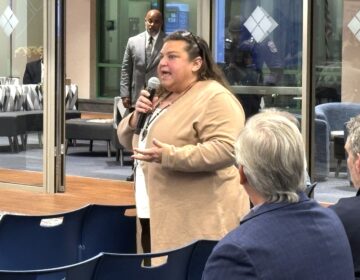‘Unauditable’: Delaware auditor says outdated systems make it impossible to verify $390 million in unemployment fund
Auditor Lydia York cites poor management and a slow response to address the financial reporting problems with the state’s unemployment fund.

Legislative Hall in Dover, Delaware. (Johnny Perez-Gonzalez/WHYY)
From Philly and the Pa. suburbs to South Jersey and Delaware, what would you like WHYY News to cover? Let us know!
This story was supported by a statehouse coverage grant from the Corporation for Public Broadcasting.
Delaware’s auditor of accounts says independent auditors cannot prove how much money is actually in the state’s unemployment insurance trust fund for 2023.
Auditor Lydia York has issued a special report blasting the financial management of the state’s unemployment insurance trust fund. In it, she calls out mounting problems over several years that failed to be addressed due to factors including a lack of oversight, outdated systems and limited training. Delaware employers pay into the fund, which pays out jobless benefits.
The report was sparked by accounting firm CliftonLarsonAllen issuing what’s called a “disclaimer of opinions,” meaning it couldn’t rely on the state’s documentation to confirm bank statements that there is about $390 million in the reserve. The Department of Labor and its offices were unable to provide detailed accounting records for net position, activities and cash flows for fiscal year 2023.
York said they can document the benefits paid with certainty, but not the employer contributions.
“Imagine if all you got was a bank statement that showed you what your balances were on any given day, but you got none of the detail that supported it,” she said. “So you know how much money you have, you know what came in, you know what went out, but on the coming in part, you really don’t know where it came from.”
York and the directors of the Department of Finance and the Unemployment Insurance Office say the COVID-19 pandemic, which began in 2020, exacerbated issues with the state’s antiquated accounting system and processes.
“Due to the volume that came into the department during COVID, the system that was already perhaps not as robust as we would have liked, groaned and creaked and then failed,” York said.
Darryl Scott, director of the state’s unemployment insurance office, said that during the first two years of the pandemic, it paid out about $1.4 billion to more than 107,000 people. The state usually handles about $60 million annually, he said.
York’s report acknowledged the strain COVID put on the unemployment office, but also said it was not an excuse. The issues with the management of the trust fund have persisted since 2020 but became acute in the past few months. Audits dating back to 2020 found “significant deficiencies in internal controls.”
York takes heads of state agencies and divisions to task in her report.
“Management contributed to a critical accounting situation in the months and years preceding the current fiscal year,” the report said. “Firstly, they neglected to adhere to established policies and procedures designed to govern accounting activities within [The Department of Labor Unemployment Insurance Office]. Secondly, although external CPA firms were eventually enlisted to aid with accounting functions, [Auditor of Accounts] maintains that management did not adequately supervise the daily operations of these vendors. With closer monitoring, the extent of the issues within DOLUI might have been discernible earlier.”
Finance and its Division of Accounting have helped the unemployment office with tracking the flow of money since at least 2020, according to York’s report. The office uses several old and disconnected systems.
Despite a plan to correct the issues due for completion in 2021, problems remained, including staff not entering data into one of the systems. As a result, beginning balances for fiscal year 2022 were inaccurate. The report said the problems became acute last year, prompting the need for outside firms for support. Even then, the trust fund was unable to be audited due to all of the numbers not adding up.
The report criticizes the accounting division for a slow response and a lack of communication with UI management.
Finance director Rick Geisenberger said the state knows the amount of money in the trust fund because it gets a report from the U.S. Treasury. He rebuffed criticism in the report aimed at one of his divisions.
“She’s an independently elected official, and she can say whatever she wishes to say,” he said. “I believe the division of accounting did exactly what it’s mandated to do.”
York also notes in the report that Scott hired several managers in 2023 who didn’t receive proper training and her office had limited access to his staff during her inquiry.
UI manager Daryl Scott said the office doesn’t have dedicated training resources. He also said the intent to be accessible was there.
“I thought we made our staff readily available, but I know we had other issues and other business priorities going on at the same time that required us to maybe have people in different places when the auditor wanted to meet.”
Geisenberger said there shouldn’t be any concerns about the health of the trust fund despite this disclaimer finding. He said the reserve sits at 140% of recommended ratios.
York listed several recommendations in her report, including implementing another corrective plan immediately, making sure the information in the unemployment office’s databases is accurate and establishing robust internal controls.
Scott and Geisenberger said efforts are ongoing to modernize the office’s systems. The process could still take a couple more years. But everyone involved said they were hopeful that the fund could be audited for fiscal year 2024 and retroactively for fiscal year 2023.
WHYY is your source for fact-based, in-depth journalism and information. As a nonprofit organization, we rely on financial support from readers like you. Please give today.







